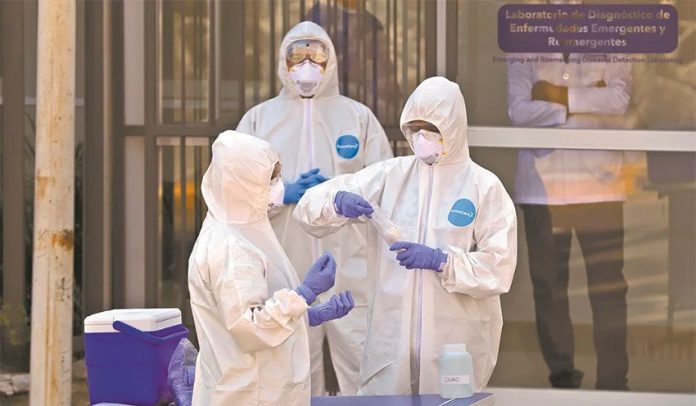Health authorities are investigating whether a strain of the coronavirus detected in four people in Jalisco is a Mexican variant of SARS-CoV-2, a senior health official said Sunday.
Four cases of the virus with the E484K mutation were detected on Friday. The mutation, which appears to make the coronavirus more contagious, has been detected in new strains in South Africa and Brazil.
The cases are under investigation by the federal Institute of Epidemiological Diagnosis and Reference and state health authorities.
“We have to characterize their important components, the combinations of several mutations that the virus might have,” said Ruy López Ridaura, director of the Health Ministry’s National Center for Disease Prevention and Control Programs.
He told the Health Ministry’s coronavirus press briefing that it has to be determined if the virus is a new strain and if so it must be established whether it is more virulent or causes a more serious Covid-19 illness.
“… There are most probably mutations of the virus that are circulating among the Mexican public. In order to say [we have] a Mexican variant and to describe it as such, its significance [in terms of contagiousness and potential for harm] has to verified. It’s probable that there are several mutations that don’t have any impact” beyond that caused by the original strain, López said.
Meanwhile, Jalisco Governor Enrique Alfaro announced that the coronavirus restrictions that have been in place for the past two weeks will be extended until February 12.
Restrictions on opening hours and the ban on some economic activities in Jalisco, currently maximum risk red on the federal coronavirus stoplight map, were due to end on Sunday. But Alfaro said the government – which has used it own criteria rather than those of federal authorities to determine restrictions – had decided to keep the current rules in place because Jalisco is now facing “the most critical point of the pandemic.”
“We managed to stabilize things in … the past four days but we are [still] at the peak of the last 11 months of [the pandemic], during which we’ve worked intensively to look after lives and the health of Jalisco residents,” the governor said Friday.
During the extended “emergency button” period, supermarkets and shopping centers remain restricted to 25% capacity while restaurants can operate at 50% but must close by 10:00 p.m. Parks, sports centers and gyms will be permitted to reopen on Tuesday in recognition of the importance of exercise to good mental health but bars and nightclubs must remain closed. Recreation and sports facilities are limited to 50% capacity and must follow all health protocols.
Jalisco has recorded just under 195,000 cases since the beginning of the pandemic, according to state government data. The figure is much higher than the number reported by federal authorities – currently just over 70,000 – because the Jalisco government includes results from private labs and rapid tests.
The western Mexico state has recorded 8,443 Covid-19 deaths, according to both Jalisco and federal authorities, and there are an estimated 4,191 active cases. The occupancy rate for general care beds is 50% while 49% of those with ventilators are taken.
Alfaro said that a comprehensive plan to respond to the pandemic throughout 2021 will be presented on February 12, explaining that it will outline a timetable to return to in-person classes.
Schools in Jalisco and across Mexico closed in March 2020 and have not reopened since in any state, forcing students to learn online and via televised classes. About three-quarters of teachers in Campeche have already received a shot of the Pfizer Covid-19 vaccine as part of preparations to reopen schools.
But the plan to restart in-person classes hit a hurdle on Friday when the federal Health Ministry announced that Campeche would lose its green light low risk status and become a yellow light medium risk state on Monday.
Source: El Economista (sp), El Universal (sp), Informador (sp)
